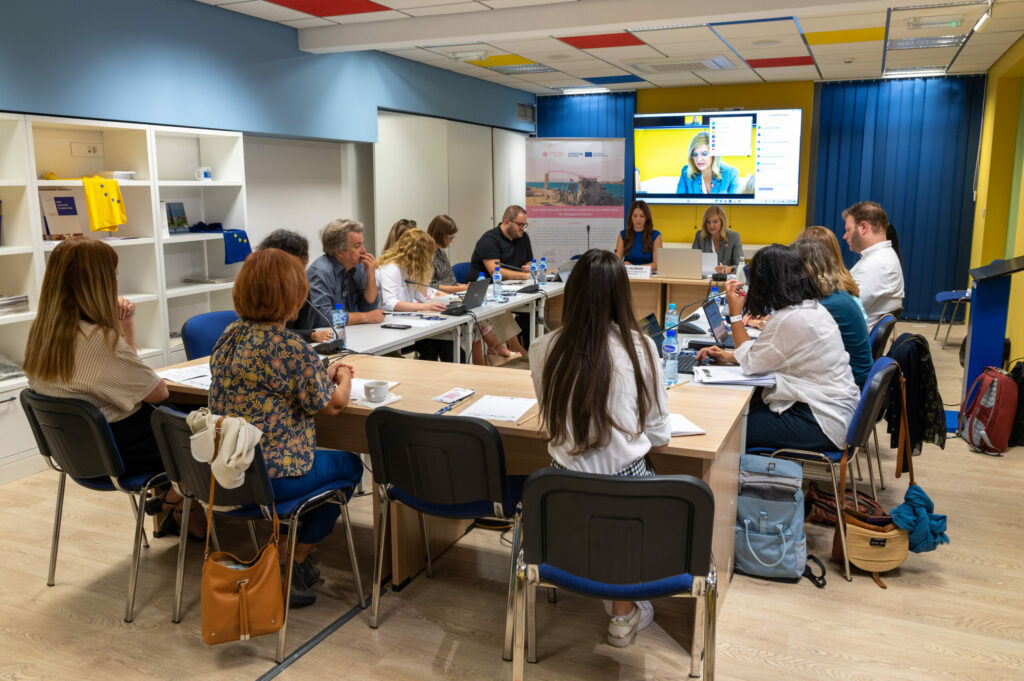The National Tourist Organisation of Montenegro (NTO CG), as part of the “Tourism Dialogue” project, organised a conference in Podgorica on the topic of “First Steps Towards Collaborative Management of Sustainable Tourism in the Mediterranean.”
This is a project dedicated to improving tourism management in the Mediterranean region, in which NTO CG is the leading partner from Montenegro, and the associated partner is the Statistical Office MONSTAT. The project aims to create greener and smarter tourism in the Mediterranean through intensive cross-border cooperation. Partners from seven Mediterranean countries (Spain, France, Greece, Italy, Cyprus, and Croatia) attended the conference in Podgorica.

The conference was organised as part of a two-day event at Europe House. Besides project partners, representatives from the Ministry of Economic Development and Tourism and the Chamber of Commerce of Montenegro also participated.
One of the conference’s conclusions was the need to improve coordination and institutional capacities, as well as strategies and initiatives, to transform tourism into a greener, smarter, and more resilient industry in the face of global challenges to ensure sustainable growth in the future.
Marina Šuković, the Representative of the Statistical Office MONSTAT, gave a presentation on sustainable tourism development in the Mediterranean. She emphasised that cross-border projects are of exceptional importance for synchronising activities and transferring knowledge, which is the only way to achieve effective tourism management in the Mediterranean.

Ana Đurnić, the Representative of NTO CG, stated that these events create a unique opportunity for exchanging ideas, experiences, and best practices towards achieving a common goal, i.e. sustainable destination development. Đurnić reminded that the global tourism industry has faced unprecedented challenges in recent years.
“Climate change, overdevelopment, and uncontrolled tourist activities have endangered the very landscapes and communities that make the Mediterranean so enchanting. It is no longer enough to simply enjoy this paradise; we must protect and nurture it for generations to come,” explained Đurnić, adding that Montenegro is not an exception in this regard.
“In Montenegro, as in the wider Mediterranean region, we are called upon to reduce our ecological footprint, promote eco-friendly transportation, and support the local communities that are the heart of this country. By doing this, we can preserve Montenegro’s unique charm while providing its inhabitants lasting economic benefits,” concluded Đurnić.

Goranka Lazović, Head of the Directorate for Tourism Competitiveness in the Ministry of Economic Development and Tourism, stated that tourism is one of the largest global “businesses,” and that is why the scope of its socio-economic and ecological impact is also very large.
“A large part of this impact is very positive – it manifests itself in new job opportunities and new experiences for tourists in our countries,” said Lazović, adding that, however, there are undoubtedly real and very significant negative impacts that we, as decision-makers, business people, and citizens, must recognise and do our best to eliminate or at least minimise. It is essential for us to be aware of the constant need to upgrade our abilities in terms of defining and implementing strategies and project tasks aimed at adapting to constant challenges. In doing so, I especially emphasise the importance of regional cooperation, as only through joint efforts can we ensure the prosperity of the region,” concluded Lazović.

“In today’s world, the principles of environmental preservation, society, and governance (ESG principles) are becoming increasingly important,” said Ivana Gajović, a member of the Tourism and Hospitality Committee of the Chamber of Commerce of Montenegro, during her introductory presentation. She explained that ESG principles encompass a set of standards that guide corporate policies to align with sustainable development concepts in the areas of environmental protection, social responsibility, and corporate governance.
Gajović added that the challenges facing the tourism sector can only be overcome through strategic and collective efforts, including the private sector and state institutions, as well as active participation in regional initiatives of common interest.
The ‘Tourism Dialogue‘ project is supported through the INTERREG Technical Support Programme for the Euro-Mediterranean Transnational Programme 2021-2027 (Euro-MED) and will last for seven years. In addition to NTO CG and MONSTAT, who is an associated partner in this project, partners include the Andalusian Public Foundation “El legado andalusi” from Spain as the leading partner in the project, the Provence-Alpes-Côte d’Azur Region from France, the Institute for Agriculture and Tourism – IPTPO from Croatia, the Municipality of Varna from Bulgaria, the European Public Law Organisation – EPLO from Greece, the Ministry of Transport, Communications, and Works from Cyprus, the Lazio Region from Italy, and 24 other associated partners from the EUROMED area.”
